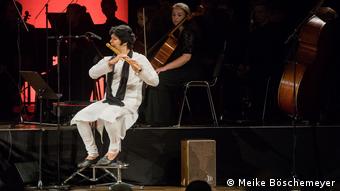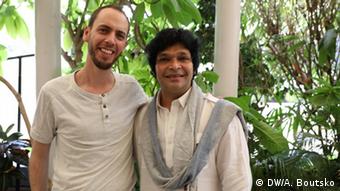At the world premiere of the Campus concert of Indian music met European musical universe create. An exciting mix – and not an easy task for the musicians.

The young German and Indian musicians agreed with a Smile and Look, while the violin in a passionate, upright bass, Tabla, or Bansuri-flute-playing: the chemistry on the stage, was felt even in the audience. At the end there was a Standing ovation at the Beethoven Campus concert on Thursday in Bonn. To combine the Experiment with Indian sounds and rhythms with the European musical universe create, was a complete success.
World premiere of the DW-composition “Kismet”
Under the leadership of the Austrian percussionist Bernhard Schimpelsberger, the national youth orchestra and the combo “SPLASH – percussion NRW presented” together with Indian musicians and dancers in addition to works by Philip Glass and Param Vir, the DW-to-order production “Kismet” (fate) – in keeping with the Motto of the beethovenfest. The piece listed the following day, also in Berlin, had composed schimpelsberger, together with the young Indian Bansuri-flute player Rakesh Chaurasia specially for the Deutsche Welle. The musical direction of the Evening was Leslie Suganandarajah.

Rakesh Chaurasia plays the Indian Bansuri flute
Rich in tradition, a project of encounter
The joint project “Campus” is hosted by Deutsche Welle and the beethovenfest since 2001. It is a meeting format for the cultures of Europe and various transmission regions of the DW. Framework and implementation are always different, but always it comes to one thing: the encounter of cultures in a spirit of mutual openness. In past years, the countries of the Ukraine, to Brazil, to China and Iraq and the host countries of the project. In 2018, an entire subcontinent with a great, the West is largely unfamiliar musical culture is at the heart of the Campus-concert: India.
“Mission impossible”?

Young German and Indian percussionists in the Workshop in Mumbai
So the task felt initially that had been the Campus project this year – namely, to bring the Indian classical and West-European music together in a productive dialogue. “Because you can only fail”, experts warned. Because both music traditions are a cosmos.
The Indian classical art music is one of the few historically grown, complex musical tradition, which has not been replaced by the contact with the Western world or marginalized. Although it resembles in its Strict, Traditional solidarity and discipline of the Aesthetics of Western classical music; however, it is completely different, because the Indian classical music is improvised.
German-Indian dialogue inspires in India
Already in January 2018, the national youth orchestra had travelled to India. “Because classical music has a long Tradition, we have travelled without any special expectations to India,” confesses Sönke Lentz, project Manager of the national youth orchestra. On-site exceeded all expectations: most of The concerts were so crowded that spontaneous video transfers were in the Foyer is needed.

Full halls during the concert of the national youth orchestra in Mumbai
In addition, the members of the national youth orchestra were able to see much of the country’s cultural treasures to admire, and came up with young Indians and Indians in contact, told Lentz. “These are experiences that are in the joint development of the new programme is indispensable.”
The rhythm is the link
So also the Central idea of the India Campus has matured to the rhythm as a link between the Indian and European culture in the center. The second Phase followed in April: Young German percussionist of the SPLASH-Ensemble NRW traveled on behalf of the DW and the beethovenfest Bonn to Mumbai. Here they met their Indian colleagues, the tabla player from the Taal Yogi’s Ashram in Pune. Two Kathak dancers were; the rhythmic dance is an indispensable Element of the Indian percussion. What followed was a week of intense exchanges. The chemistry was instant, although the Indian musicians saw for the first Time, Western instruments such as the Marimba or Xylophone, and the young German at the beginning, difficult in the case of the Indian rhythms came along.

Bernhard Schimpelsberger (l) and Rakesh Chaurasia (right)
Only a few days before the premiere in mid-September were on the Beethoven-stage at the World Conference Center Bonn (WCCB), all of the Campus participants for the first Time, come together, to work together on your Campus program. Here, they practiced next to the DW-commissioned by the other program points of the Evening, as the composition experiment, “Meeting Along the Edge” Ravi Shankar and Philip Glass, were transferred to the rhythmic peculiarities of the Indian music to a Symphony orchestra, or a of India-inspired work of the American minimalist Steve Reich.
The DW-Campus concerts will take place on 20. September in Bonn WCCB, and a day later, on Friday, the 21.9.2018, in the University of the arts (UDK) Berlin.

